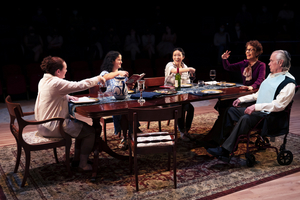Review: IN EVERY GENERATION at Victory Gardens Theater
Ali Viterbi’s National New Play Network rolling world premiere plays at Victory Gardens through May 1, 2022.

IN EVERY GENERATION explores the duality of the cyclical nature of humanity - specifically, in this play, the Jewish experience. As playwright Ali Viterbi's text reveals, sometimes cycles can be sources of comfort and tradition - as is the case with the Levi-Katz's family annual Passover Seder and many other Jewish holidays.
In this case, the cycle of ritual is a powerful moment of family gathering and remembrance. But in other ways, the cycles that humans perpetuate can be damaging - for grandparents Paola and Davide, the trauma from their experiences as Holocaust survivors lives on many years later as the family gathers for Passover 2019 in the play's first scene. The play asks if not just the Jewish people, but American society on the whole will uphold the phrase "Never Again" - are we now truly moving towards a world in which hatred - and specifically anti-Semitism - might someday be eliminated? Or are we doomed to repeat this cycle of trauma and xenophobia because human memory is simultaneously long and short?
Viterbi's play movingly dives into these questions as it shows the Levi-Katz family celebrating Passover at four dramatically different time periods: The play's first act takes place in 2019. While much of that scene feels familiar, it's also interesting to watch something that feels almost present-day but that took place before the word "COVID-19" consistently entered most conversations and upended what we deemed "normal life." Considering that many families have not been able to come together in-person for traditional Passover Seders as a result of the pandemic, it's striking to watch that unfold in the play. The second scene transports us to 1954, in which we watch Paola and Davide at Seder before the birth of their daughter Valeria and as they contemplate the simultaneous joy and fear that comes with celebrating Passover in their household. The third scene forges ahead to 2050, in which Paola and Davide's daughter Valeria celebrates with her now grown children Yael and Devorah (Dev). The final anachronistic scene takes us to approximately 1416 BCE - and while I don't want to reveal many details here, it's a moment that reflects on the origins of Passover.
Although many of the Passover rituals portrayed on stage might feel foreign to those who aren't of the Jewish faith (I am Jewish so my experience of watching these rituals that are so familiar to me in a new context was personally affecting), Viterbi also uses the final scene to explain some of the critical elements of Passover to the uninitiated. It's a clever way to do so; it avoids making the play didactic, but it provides valuable context for the audience to understand the roots of the Passover rituals.
Director Devon de Mayo keeps the production moving at a compelling pace as audiences wait to see how the four distinct scenes will fit together. Likewise, the ensemble gives lovely, understated performances. The characters are grounded in realism, and the actors give just the right energy to their roles. In some moments, emotions run high but that all feels true to the fact that Jewish holidays often bring up family tension. Carmen Roman and Paul Dillon are moving as Paola and Davide; the pair have a natural rapport that makes us believe in their affectionate and companionate love for one another.
As Valeria, Eli Katz gently expresses her character's exhaustion and depression in the play's first scene in the wake of her divorce from Yael and Devorah's father (a rabbi who does not appear onstage). Katz grieves the dissolution of her marriage and the ways in which her husband betrayed her trust, and she also conveys just the right level of affectionate motherly love for her daughters. And it shows that some of her ways of showing affection are more subtle. She may be suffering, but she's determined to perfect her grandmother's Passover dessert recipe and make sure that her family has that at the Seder.
Esther Fishbein makes Yael the right balance of feisty and slightly righteous. She's a freshman at Yale when we first meet her in the play, eager to show off her new knowledge. Sarah Lo gives a layered performance as Devorah, who must reconcile her deep connection to her Jewish faith and her desire to learn more about her Chinese roots as an adopted member of the family. Viterbi also sets up an interesting contrast between the sisters, who have such vastly different relationships to Judaism in their lives. Devorah laments that she resents Yael for having Judaism in her blood, while Yael doesn't seem to totally understand the depth of her sister's religious devotion.
IN EVERY GENERATION's title sends up the Hebrew expression "L'dor v'dor," which translates to "From generation to generation." Viterbi's play probes the themes of what exactly it means to pass down the dual threads of ritual and trauma from those who came before us. And the play succeeds in that Viterbi opens up these questions but doesn't provide tidy answers. It was also a unique experience to see the ritual of Passover Seder enacted onstage; I was emotional watching the Four Questions recited in the first scene. And indeed the Four Questions is an interesting anchor point in the text. The questions ask "Why is this night different from all other nights?" But IN EVERY GENERATION underscores that the cycles of human experience often repeat themselves - and that the differences between every generation - and specifically every generation of the Levi-Katz family - might not be as different as we may think.
IN EVERY GENERATION plays at Victory Gardens Theater, 2433 North Lincoln Avenue, through May 1, 2022. Tickets are $29-$62. Visit VictoryGardens.org.
Photo Credit: Liz Lauren
Review by Rachel Weinberg
Reader Reviews

Videos

